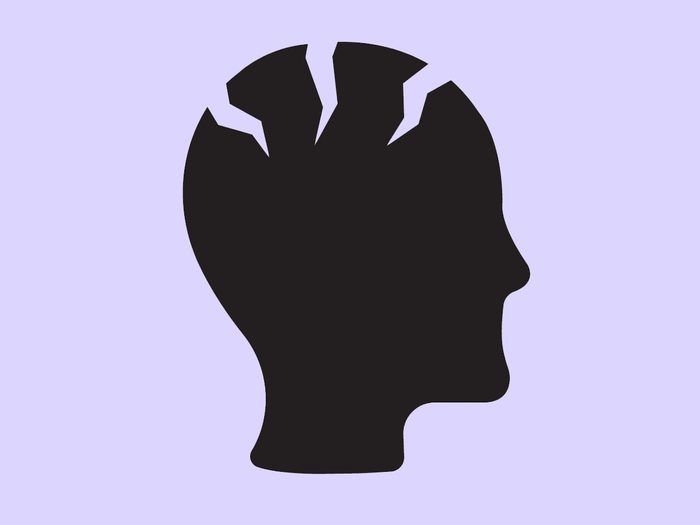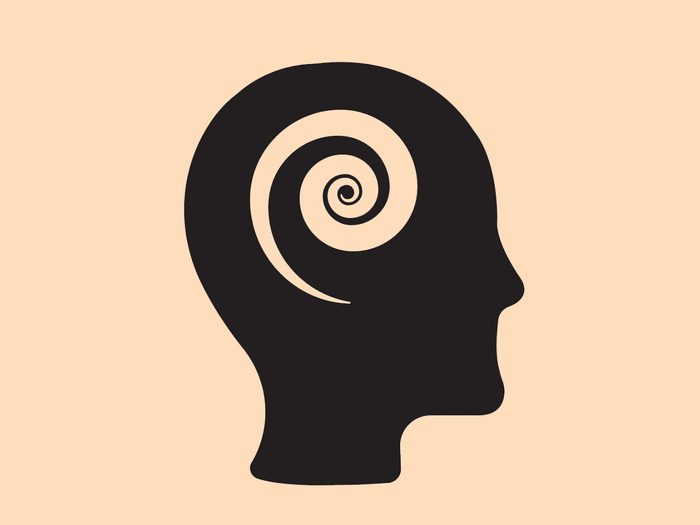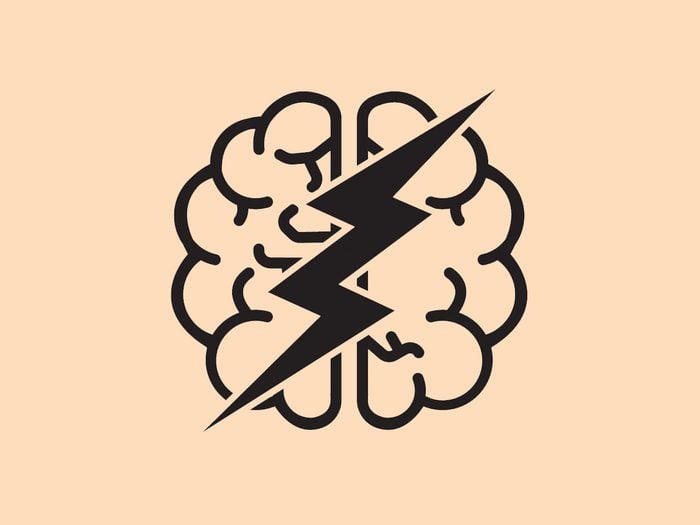
Don’t ignore fuzzy thinking
If you’ve ever felt spaced out, absent-minded, cognitively “off,” or unable to focus for an extended period of time, you’ve probably experienced the kind of mental fatigue known as brain fog. Medical professionals warn that brain fog could indicate a more serious underlying health issue—so instead of simply tolerating your fuzzy thinking, consult a doctor to either rule out or address these common causes.

You might have depression
Clinical depression is a familiar trigger for the cognitive dysfunction associated with brain fog. Depression can compromise your mental clarity, reaction time, and mood. According to the World Health Organization, 300 million people around the world live with clinical depression. If you have a hunch you might be one of them, make an appointment with your general practitioner to get screened. Your GP will run blood tests and other laboratory tests and refer you to a specialist, including a psychiatrist, if necessary. If you’ve already been diagnosed with the condition and prescribed an antidepressant to treat it, ask your doctor whether brain fog could actually be a side effect from the medication. Brain fog is not even the most bizarre side effect of common medications. It may be a good idea to take a mental health day.

Your sleep could be suffering
Burning the midnight oil? Adults require between seven and nine hours of shut-eye, so if you’re not getting enough—or you’re one of up to 70 million U.S. adults who has a disruptive sleep disorder, like insomnia or sleep apnea, according to the American Sleep Association—then sleep deprivation could be the culprit of your brain fog. Overnight, your brain restores itself—and scientists have discovered that not getting enough sleep literally impedes your brain’s ability to fire neurons the way it’s supposed to. It can leave you scatterbrained and moody and limit your attention span. To upgrade the quality of your snooze, the Better Sleep Council suggests adopting and being consistent with healthy habits like banning personal electronics from your bedroom, keeping the room temperature between 65 and 67 degrees, and hanging onto your mattress for no longer than seven years before replacing it. Here are other hacks to ensure you get your vitamin Zzz.

Your hormone levels might be changing
A common trigger for brain fog in women of all ages is the body’s delicate and ever-shifting balance of hormones. The condition can be most pronounced during menopause and perimenopause, the years leading up to the change. Proper cognitive functioning is the norm, regardless of age, according to Aviva Romm, MD, a faculty member with the Center for Mind-Body Medicine and author of The Adrenal Thyroid Revolution. Brain fog during this period could indicate fluctuations in estrogen and other hormones, leaving you with a cloudy head and trouble concentrating. But pregnancy, PMS, and menstruation—especially when accompanied by severe cramps or endometriosis—can contribute to brain fog in women of reproductive age, too. If this all sounds painfully familiar, it’s smart to make an appointment with an endocrinologist, who can run blood tests to diagnose an imbalance and determine a treatment plan to restore your hormonal health. Here’s how to deal with hormones that are out of control.

It could be poor eating habits
Your confusion, indecisiveness, and anxiety could be rooted in a very fundamental aspect of your overall health—your diet, warns Dr. Romm. For instance, consuming too much sugar, caffeine, and alcohol over a long period of time can put you at an increased risk of brain fog. Caffeine may give you a spike in alertness, but when it wears off, irritability, fatigue, and a lack of focus can set in, causing a mid-day crash, a sign that you’re drinking too much caffeine; ditto for too much sugar. Studies indicate that people who were once heavy drinkers and either curbed or stopped their long-term alcohol consumption felt their brain fog lift. Gluten and dairy sensitivities can also cloud your thinking, as can eating too much protein. Your doctor can use tools like skin tests and blood tests to identify food intolerances and allergies. John E. Lewis, PhD, associate professor in the Department of Psychiatry and Behavioral Sciences at the University of Miami Miller School of Medicine, suggests putting “an emphasis on an organic whole-food, plant-based diet with a wide range of vegetables, fruits, nuts, seeds, and legumes while minimizing animal, processed, fatty, sugary, and GMO foods.”

Are you getting enough exercise?
If you visit a doctor complaining of brain fog—and you have no underlying medical conditions—a doctor will probably evaluate your physical fitness status, including your strength, aerobic capacity, flexibility, and neuromotor function, says Lewis. “If someone is sedentary,” he says, “then a comprehensive exercise routine should be initiated at the proper starting level and adjusted over time as the body adapts and responds to training.” And it’s not just your physique that reacts to exercise—all of your internal organs, including your brain, get a workout too. Physical activity reduces inflammation, releases feel-good endorphins, and can even help you cope with grief or depression.

Consider testing for a vitamin deficiency
Lewis cautions that a vitamin B12 deficiency or insufficiency is related to memory problems and central nervous system dysfunction, particularly in seniors. (Here are other signs you’re not getting enough B12.) But that’s not the only vitamin deficiency to look for. If your body lacks folate, thiamine, niacin, and vitamin B6, you could also experience brain fog. The brain also uses vitamin C to fight inflammation, a notorious cognitive fog culprit. Blood tests can determine whether or not there is cause for concern. Some doctors recommend taking supplements to meet your vitamin intake needs, but most agree that you can get all the vitamins and nutrients you need from nutrition. You would need to evaluate your daily dietary habits and tailor your diet to your needs.

Fibromyalgia might be to blame
The chronic condition called fibromyalgia is marked by chronic muscle pain, tender joints, fatigue, and sleep disturbances. Brain fog is so common in people living with the syndrome that it’s often referred to as ‘fibro fog.’ Symptoms include short-term memory loss, fuzzy thinking, distractibility, and difficulty carrying on conversations, according to the Arthritis Foundation. A doctor will ask you about your family’s medical history and run diagnostic tests to find out if your brain fog could be rooted in fibromyalgia. There is no cure for the condition, but medication combined with lifestyle changes can make it more manageable.

Get tested for hypothyroidism
Your thyroid is a butterfly-shaped gland located in your neck; it’s responsible for almost every function in your body, including hormone production and regulation, heart and digestion function, and muscle control. It can also impact your mood and contributes to brain development, according to the Society of Endocrinology. If your brain fog is thyroid-related, it could become a diagnosis of hypothyroidism, which means the gland is unable to produce enough thyroid hormones. A doctor will run blood tests to determine whether you suffer from this fairly common affliction. If you do, you may be prescribed prescription medication and encouraged to modify your diet. Here’s how to tell if you have a hidden thyroid problem.

It could be coming from chronic stress
Alleviating the stress in your life has been known to clear up brain fog when all other factors have been eliminated. “Lack of stress management can negatively impact the hypothalamus-pituitary-adrenal axis, which dysregulates cortisol and other hormones that could also increase the occurrence of brain fog,” says Lewis. Of course, cutting out stress is easier said than done, but there are effective ways to manage the stress you deal with on the daily. Making changes to many of the factors already discussed—including your exercise, eating, and sleeping habits—can have an incredible impact. Meditation has also been embraced by Western medicine in recent years for its reported ability to ease mental stress. If stress feels out of your control, a visit to a mental health professional can arm you with effective tips for leading a happy, healthy, and fog-free life.
Medically reviewed by Oscar H. Cingolani, MD.
Now that you’ve learned the causes of your brain fog, check out which habits can boost your brain health.
